Monégasque euro coins
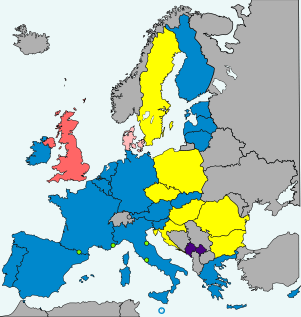
-
<dt class="glossary " id="European Union (EU) member states" style="margin-top: 0.4em;">European Union (EU) member states
- Non-EU member states
Monégasque euro coins feature two separate designs for the first two series of coins, and also two separate designs for the €1 and €2 coins for the first series. All the coins are inscribed with the word "Monaco" and the twelve stars of Europe. The Monégasque euro coins are minted by the Monnaie de Paris (Paris Mint).
Monégasque euro design
For images of the common side and a detailed description of the coins, see euro coins.
In Monaco the euro was introduced in 2002. However, the first sets of coins were minted, as preparation, in 2001. Hence the first euro coins of Monaco have minted the year 2001 instead of 2002.
First series (2002–2005)
| € 0.01 | € 0.02 | € 0.05 |
|---|---|---|
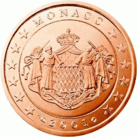 |
 |
 |
| The coat of arms of Monaco | ||
| € 0.10 | € 0.20 | € 0.50 |
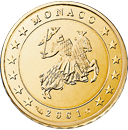 |
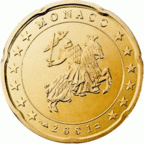 |
 |
| The seal of Monaco | ||
| € 1.00 | € 2.00 | € 2 Coin Edge |
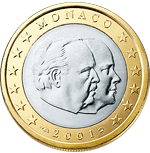 |
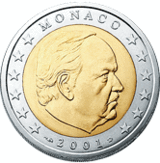 |
|
| Prince Rainier III and Prince Albert II effigies | Prince Rainier effigy | |
Second series (2006–present)
With the accession of Prince Albert II, new designs were warranted and these were issued in December 2006.
| € 0.01 | € 0.02 | € 0.05 |
|---|---|---|
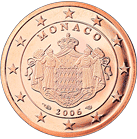 |
 |
 |
| The coat of arms of Monaco | ||
| € 0.10 | € 0.20 | € 0.50 |
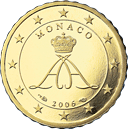 |
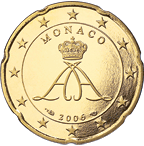 |
 |
| The monogram of Prince Albert II | ||
| € 1.00 | € 2.00 | € 2 Coin Edge |
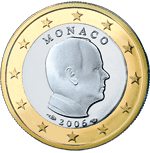 |
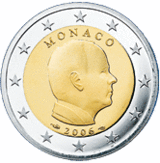 |
|
| Effigy of Prince Albert II | ||
Circulating mintage quantities
| Face Value [1] | €0.01 | €0.02 | €0.05 | €0.10 | €0.20 | €0.50 | €1.00 | €2.00 |
|---|---|---|---|---|---|---|---|---|
| 2001 | 327,200 | 373,400 | 300,000 | 300,000 | 366,400 | 300,000 | 971,100 | 899,800 |
| 2002 | *** | *** | *** | 367,200 | 336,000 | 324,000 | 472,500 | 456,000 |
| 2003 | * | * | * | 100,800 | 100,000 | 100,000 | 135,000 | 228,000 |
| 2004 | *** | *** | *** | *** | *** | *** | *** | *** |
| 2005 | *** | *** | *** | * | * | * | * | * |
| 2006 | *** | *** | *** | *** | *** | *** | *** | *** |
| 2007 | * | * | * | * | * | * | 100,000 | * |
| 2008 | * | * | * | * | * | * | * | * |
| 2009 | *** | *** | *** | *** | *** | *** | *** | 250,000 |
| 2010 | * | * | * | * | * | * | * | *** |
| 2011 | *** | *** | *** | *** | *** | *** | *** | 1,032,052 |
| 2012 | * | * | * | * | * | * | * | 1,082,373 |
| 2013 | *** | *** | *** | *** | *** | *** | *** | *** |
| 2014 | *** | *** | *** | *** | *** | *** | 1,000,272 | 772,000 |
| 2015 | * | * | * | * | * | * | * | 1,306,782 |
| 2016 | * | * | * | * | * | * | 1,000,000 | 864,645 |
|
* No coins were minted that year for that denomination | ||||||||
€2 commemorative coins
Notes
- ↑ Kosovo is the subject of a territorial dispute between the Republic of Kosovo and the Republic of Serbia. The Republic of Kosovo unilaterally declared independence on 17 February 2008, but Serbia continues to claim it as part of its own sovereign territory. The two governments began to normalise relations in 2013, as part of the Brussels Agreement. Kosovo has received recognition as an independent state from 110 out of 193 United Nations member states.
References
- ↑ "Circulating Mintage quantities". Henning Agt. Retrieved 2008-08-19.